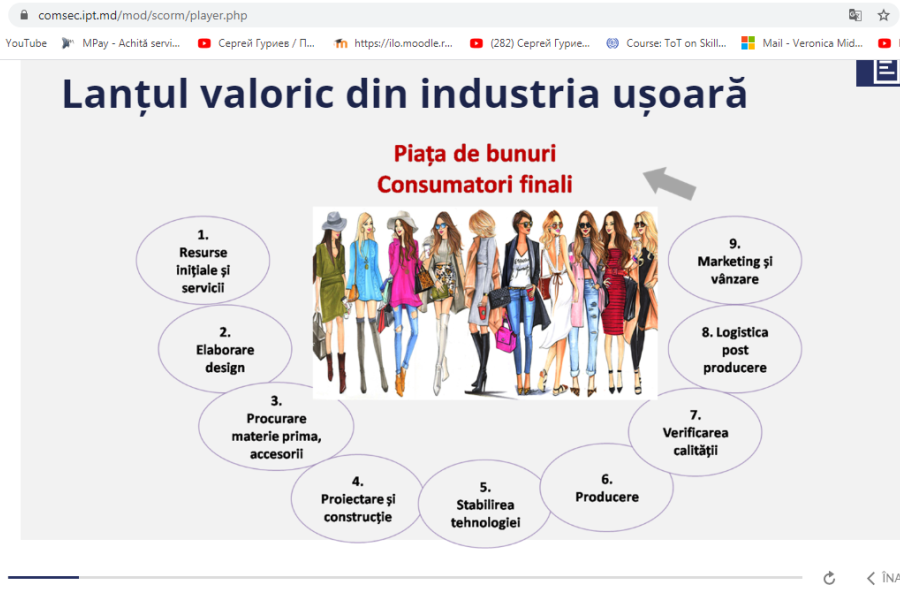E-learning Platform for Sectoral Committees for Vocational Training Incorporates New Functionalities
22 June 2020
In the midst of the COVID-19 pandemic, an e-learning platform designed by the International Labour Organization (ILO) has proven to be a valuable tool for developing the Sectoral Skills Committees (SSCs) in Moldova.

Launched in February, this online non-formal learning platform is an innovative tool that combines e-learning courses with labour market developments. It is directed at representatives of the Sectoral Skills Committees for Vocational Training and central public authorities and other actors involved in development of VET sector. The platform aims at strengthening the capacities of SSC members and related actors to shape vocational training with the labour market needs and workforce development and making it more responsive to the skills needs of the companies in each economic sector.
”This e-learning platform was created out of the need for continuous training of the current and future members of the Sectoral Skills Committees, as well as of other actors engaged in the vocational training system development. Their continuous training is necessary given the important role of the Sectoral Skills Committees in the development of occupational standards and validation of qualification standards as well as in the analysis of the situation within the sector,” said Violeta Vrabie, ILO Project Coordinator.
The mission of the SSCs is to support the development of the workforce within their sectors. They do so with the aim to increase company productivity, innovation capacity and, consequently, the economic development of Moldova in the context of globalization. They establish a connection between labour supply and demand on the labour market by connecting education system with the needs of the economy. The members of SSCs carry out complex activities, from strengthening the social dialogue among the partners in formulating and implementing the labour market requirements, to cooperating with enterprises, workers and other economic actors in the identification of labour market trends and supporting the vocational training system in workforce training.
The e-learning platform contains four basic modules that deal with the mission, functions and duties of the SSCs for Vocational Training, with labour market analysis tools and with relevant indicators for identifying the professional skills needed within each economic sector. Participants registered on the e-learning platform can also strengthen their skills in the development and implementation of projects. Once the learning cycle started, the participants developed a high degree of motivation. In particular, they opted for conducting additional weekly group learning sessions under a mentor's guidance, to intensify the learning transfer and create a spirit of community and group support.
According to the e-learning platform's mentor, Veronica Midari (PHD in economics and independent consultant), the platform offers not only theoretical information, but also practical tools to the participants, which they can fully apply in their professional work. "In addition to other opportunities, the e-learning platform gives them the possibility to set up working groups and to debate specific topics in a discussion forum. We have analysed the value chains of several economic sectors and, together with the participants, we have planned an economic analysis in different industries under the effect of COVID-19, thereby applying some of the research tools previously studied. The platform has given a unique opportunity to strengthen the core of the Sectoral Skills Committees and has created long-term cohesion for an efficient and sustainable cooperation,” Veronica Midari added.
”Digital solutions are a necessity, especially under the conditions of the pandemic generated by the coronavirus. We are happy to have an educational tool that is fully functional and accessible to us at any time. I was impressed by how the value chain can be used to analyse the professional skills needed in a sector. The international models presented during the training were also very useful. For instance, we will take over the plans of the sectoral committees for skills enhancement of Scotland and analyse them together with the line ministries,” said Mr. Gangura, member of the Sectoral Skills Committee for the Light Industry.
At present, there are six Sectoral Committees in the Republic of Moldova:
- Sectoral Committee for Vocational Training in Constructions;
- Sectoral Committee for Vocational Training in Agriculture and Food Industry;
- Sectoral Committee for Vocational Training in Light Industry;
- Sectoral Committee for Vocational Training in Trade, Hotels and Restaurants;
- Sectoral Committee for Vocational Training in Financial Intermediation, Insurance and Real Estate Transactions;
- Sectoral Committee for Vocational Training in Water Distribution; Sanitation, Waste Management, and Decontamination.
"Thanks to the trainings organised through this e-learning platform, the Sectoral Skills Committee representatives are better aware of their roles and mandates as well as of the existing opportunities and tools for adjusting vocational training to the labour market needs. They have developed a strategic vision of activities and actions to be taken to improve the social dialog and skills training of SSC. This innovative tool will enable the continuous training of the representatives of the existing Sectoral Committees as well as of those to be registered," said Mariana Stircul, from the Department of Occupational Policies and Migration Regulation at the Ministry of Health, Labour and Social Protection.
The e-learning platform was launched by ILO under the Promoting Youth Employment Project and will be administered by the Ministry of Education, Culture and Research in partnership with the Ministry of Health, Labour and Social Protection.
For more information, please contact us by email: vrabie@ilo.org or by telephone: + (373) 78 11 33 90.



